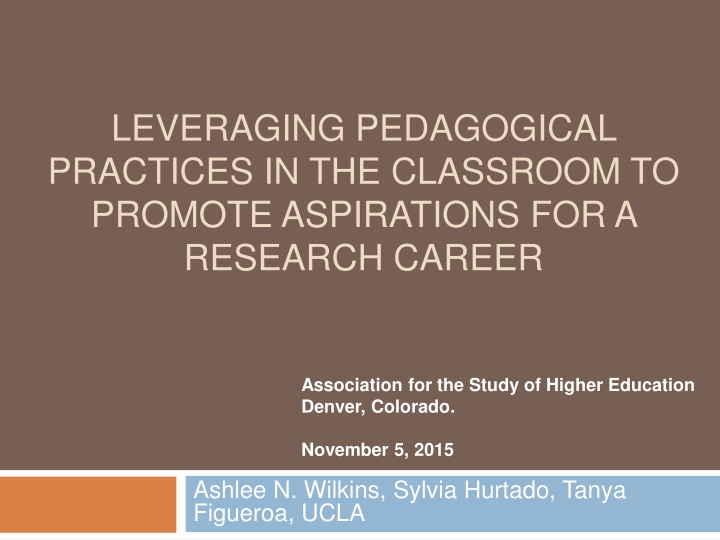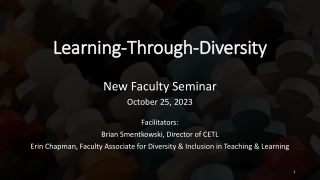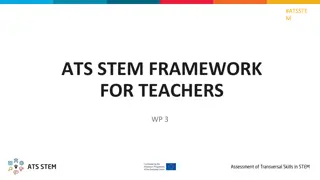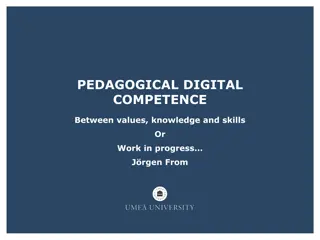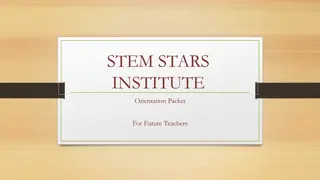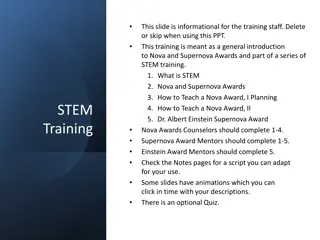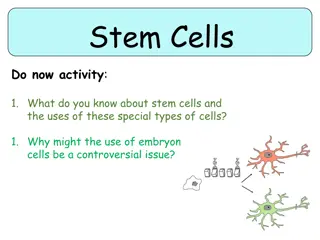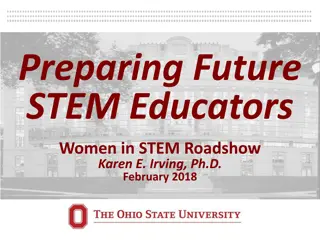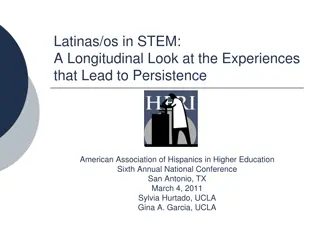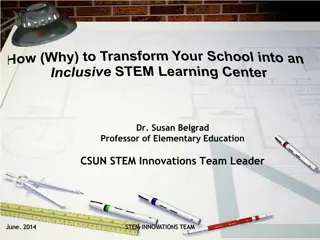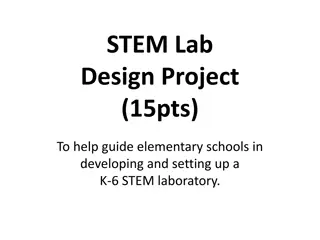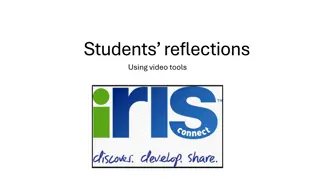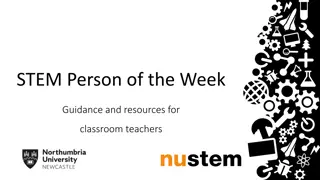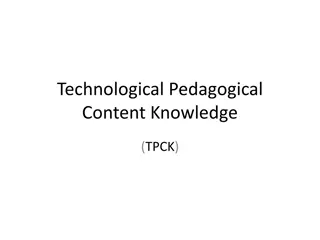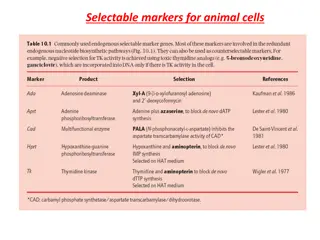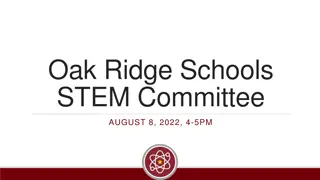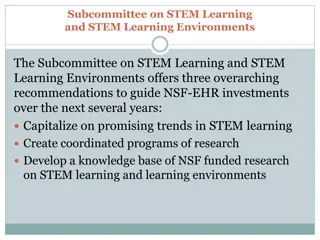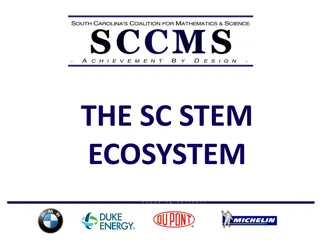Promoting STEM Research Career Aspirations Through Pedagogical Practices
This study explores the impact of pedagogical practices in introductory STEM courses on students' aspirations towards research careers. It investigates the differences in effects on Underrepresented Racial Minority (URM) students and non-URM students, as well as variations in experiences within these classes. By analyzing student data from various institutions, the research aims to identify practices conducive to nurturing STEM research career interests. The study applies Social Cognitive Career Theory and employs statistical models to assess the influence of classroom experiences on career goals.
Download Presentation

Please find below an Image/Link to download the presentation.
The content on the website is provided AS IS for your information and personal use only. It may not be sold, licensed, or shared on other websites without obtaining consent from the author.If you encounter any issues during the download, it is possible that the publisher has removed the file from their server.
You are allowed to download the files provided on this website for personal or commercial use, subject to the condition that they are used lawfully. All files are the property of their respective owners.
The content on the website is provided AS IS for your information and personal use only. It may not be sold, licensed, or shared on other websites without obtaining consent from the author.
E N D
Presentation Transcript
LEVERAGING PEDAGOGICAL PRACTICES IN THE CLASSROOM TO PROMOTE ASPIRATIONS FOR A RESEARCH CAREER Association for the Study of Higher Education Denver, Colorado. November 5, 2015 Ashlee N. Wilkins, Sylvia Hurtado, Tanya Figueroa, UCLA
Introduction National priority to increase the number of STEM researchers (PCAST, 2012). Increased interest in pursuing STEM degrees (Eagan, Lozano, Hurtado, & Case, 2013) Introductory STEM classrooms represent a great vehicle by which to pique students interest in STEM related research careers.
Purpose Purpose: To identify the pedagogical practices in introductory STEM courses that are conducive to cultivating students aspirations towards careers in STEM research How does the effect of these practices differ for Underrepresented Racial Minority (URM) students and non-URM students? How do experiences within STEM introductory classes differ for URMs and non-URM students?
Literature Review Introductory courses are typically referred as gatekeepers because they symbolize the initial courses in a sequence of classes where knowledge is transformed cumulative experience (Freeman, Haak, & Wenderoth, 2011). Incorporating student participation in the classroom experience develops higher-order critical thinking (Haak, HilleRisLambers, Pitre, & Freeman, 2011) Active learning techniques use students ideas in classroom discussions, encourage student interactions in class, and promote classroom involvement
Social Cognitive Career Theory (Lent, Brown & Hackett, 1994) Personal Inputs (gender, ethnicity, ability) Self Efficacy Learning Experiences (Classroom) Career Interests Outcome Expectations (Goals) Background Contextual Affordances (SES, Communities)
Methods Data source and sample: 3,205 students in 79 introductory STEM courses across 15 institutions Longitudinal: surveyed at start and end of Spring 2010 term Faculty survey, registrar data merged in Methods: Descriptive statistics Hierarchical Linear Modeling (HLM) Ran an identical model on two student samples: URMs and Non-URMs Test for equality of regression coefficients (Paternoster et al., 1998)
Variables Independent variables (predictors): Pre-Test (1) Dependent variable: Demographic Characteristics (4) Likelihood of Pursuing a Career that Includes Scientific Research (measured on a four-point scale) High School Preparation, Achievement, and Experiences (4) Classroom Experiences (19) Larger College Experiences (2) Discipline-Level Variables(3)
Results: Factors that were Significant for Both Groups Variable URM Students Non-URM Students Effect Sig. Effect Sig Pre-Test: Pursue a career that includes conducting STEM research + *** + *** Classroom Environment (Student Response) : I Feel Closer to Reaching My Professional Goals + ** + * Classroom Environment (Faculty Response): I am provided with the resources that I need to do my best work as a teacher - ** - ** Larger Classroom Experience: Improving the Health of Minority Communities + *** + *
Comparing the Effect of Significant Coefficients URM Students Non-URM Students zScore Variable Sig. Sig Pre-Test: Pursue a career that includes conducting STEM research 0.26 *** 0.30 *** ns Classroom Environment (Students Reponses) : I Feel Closer to Reaching My Professional Goals 0.21 ** 0.08 * ns Classroom Environment (Faculty Reponses): I am provided with the resources that I need to do my best work as a teacher -0.17 ** -0.10 ** ns Larger Classroom Experience: Improving the Health of Minority Communities 0.25 *** 0.06 * -2.92
Results that are Unique to URM Students Variable Effect Sig + ** Pre-College Experiences: H.S. Biology Grade + * Pre-College Experiences: H.S. Math, Science, or Engineering Research Program + * Frequency: Relate Scientific Concepts to Real- World Problems (Faculty Response) - ** HPW: Meeting Students During Office Hours (Faculty Response)
Results that are Unique to Non- URM Students Variable Effect Sig + *** Agreement: I Saw The Real-Life Application or Relevance of What I Learned - ** HPW: Working with Undergraduates on Research (Faculty Response) + * Classroom Experience: Proportion of "A" Grades given in the Class
Discussion & Implications Implications We need better assessments of classroom practice, especially of active learning techniques Early cultivation of interest in STEM research is essential Drawing connections in content: Course content should connect to URM students communities Institutions must equip faculty with the resources and support needed to improve their teaching skills
Contact Information 13 Graduate Research Assistants Administrative Staff Dominique Harrison Faculty/Co-PI s Sylvia Hurtado Kevin Eagan Krystle Corbian Damani Lewis Ashlee Wilkins Post-Doctoral Fellow Tanya Figueroa Website: www.heri.ucla.edu E-mail: heri@ucla.edu This study was made possible by the support of the National Institute of General Medical Sciences, NIH Grant Numbers R01 GMO71968-05 and 1RC1GM090776-01.This independent research and the views expressed here do not indicate endorsement by the sponsors.
